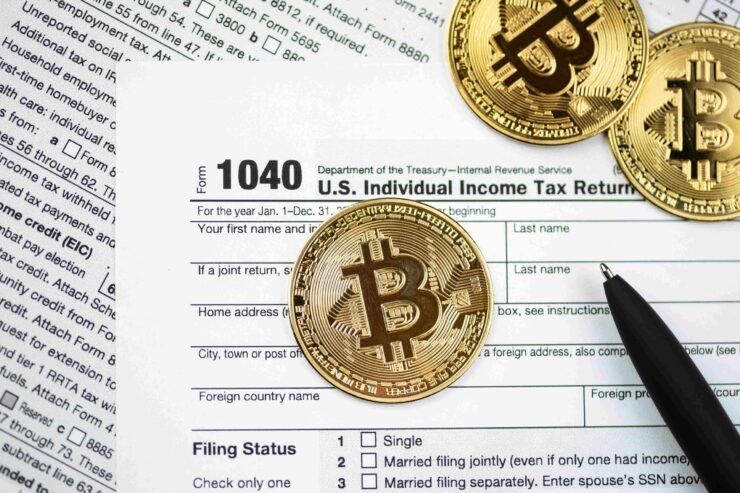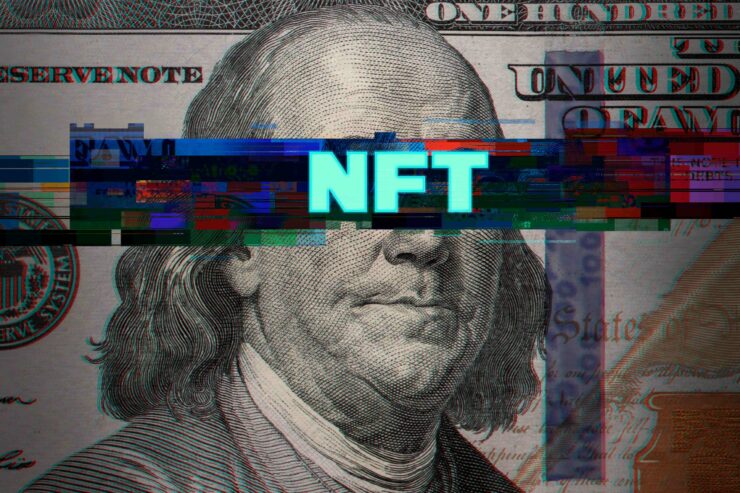The world of cryptocurrencies has brought exciting investment opportunities to the forefront, but it’s essential to recognize that these digital assets come with tax responsibilities. Here, we will explore the intricacies of cryptocurrency taxation in the United States, shedding light on what’s taxable and what’s not across a broad spectrum of crypto transactions.

Cryptocurrency Taxation in the US
The IRS introduced its initial cryptocurrency taxation guidelines in 2014. However, it wasn’t until 2019 that taxpayers were explicitly instructed to report their crypto investments on their income tax returns.
A fundamental principle has remained consistent since 2014: cryptocurrencies and blockchain-based assets are considered property for tax purposes, not currency. This means that any transaction resulting in a profit must be reported and taxed.
Tracking Crypto Holdings for Taxation
Contrary to popular belief, crypto ownership is not entirely anonymous, especially to the IRS. The tax agency can trace and analyze individuals’ crypto wallets through centralized exchange disclosures and blockchain data analysis.
Therefore, it’s crucial for investors to report their digital asset transactions on Form 1040 when filing taxes. Additionally, centralized crypto exchanges are obligated to submit Form 1099-K for investors with annual trades exceeding $20,000 or more than 200 transactions.

The IRS has been working diligently to link crypto wallets to their owners, utilizing various methods. Some wallets even allow users to connect their credit or debit cards, and sharing wallet addresses with centralized exchanges can leave a trail. It’s clear that attempting to evade taxes is a high-risk endeavor.
Bitcoin, Altcoins, or Stablecoins: Taxable or Not?
For tax purposes, there’s no differentiation between Bitcoin, Ethereum, or any other cryptocurrency. Whether they’re proof of work, proof of stake, altcoins, or stablecoins, they all adhere to the same tax regulations. What matters is whether your investment activities fall under “taxable events.”
Non-Taxable Events for Crypto Investments
- Buying and Holding Crypto: Purchasing tokens with your funds and holding them in a wallet doesn’t trigger a taxable event. However, it’s essential to maintain accurate records because the purchase cost will determine future tax obligations.
- Transferring Crypto Between Wallets: Moving tokens between wallets you own is not a taxable event. For example, transferring tokens from a software or custodial wallet to a non-custodial wallet like Ledger Nano or Trezor doesn’t require reporting.
Taxable Events for Crypto Investments
- Selling Crypto: Selling Bitcoin or any other cryptocurrency for a profit in exchange for fiat currency, such as US dollars, is taxable. The tax liability depends on the profit, and if you incur a loss, you may be able to deduct it as a capital loss, up to $3,000 annually.
- Trading Crypto: Exchanging one cryptocurrency for another at a profit is also a taxable event. For instance, buying AVAX worth $10,000 and later exchanging it for BCH worth $15,000 results in a $5000 profit, subject to taxation.
- Getting Paid in Crypto: If your employer pays your salary in Bitcoin or you receive crypto for goods or services, it’s considered taxable income, taxed at ordinary income rates, not capital gains rates.
- Mining Crypto: Income from mining Bitcoin is treated as ordinary income, whether you hold or sell the tokens. Both individual hobbyist miners and businesses must report mining rewards differently.

Deciphering DeFi Investment Taxation
Decentralized finance (DeFi) is a burgeoning field within cryptocurrencies, offering efficient alternatives to traditional financial services. While DeFi exchanges aren’t currently required to report to the IRS in 2023, the upcoming Infrastructure and Investment Jobs Act will mandate this starting in 2024. However, the IRS has yet to provide comprehensive guidance on many DeFi transactions.
Possible Taxable Events in DeFi
- Crypto Loans: Borrowing crypto doesn’t entail additional taxes, but using crypto to repay loans can be taxable. Lenders in DeFi will also face taxation on profits when loans are repaid or collateral is sold.
- Liquidity Pools, Staking, and Yield Farming: Earnings from depositing tokens into liquidity pools are taxable when received from third parties. Pair-based staking is taxable, while single-sided staking isn’t, but interest income must be reported.
- Governance Tokens/Utility Tokens: Receiving governance or utility tokens triggers taxable events, which are reported as ordinary income based on their dollar value.
Navigating NFT Taxation

Non-fungible tokens (NFTs) represent ownership of digital assets on the blockchain. Unlike traditional cryptocurrencies, NFTs lack comprehensive IRS tax guidelines.
Non-Taxable Events for NFTs
- Creating NFTs: Minting or creating NFTs doesn’t create a taxable event, as the token’s value remains unrealized.
Taxable Events for NFTs
- Selling NFTs: Selling NFTs and receiving proceeds, typically in ETH, is a taxable event. The seller reports ordinary gains, as NFTs are considered non-capital assets. Buyers who later sell NFTs must report capital gains or losses.
- Purchasing NFTs: Buying NFTs doesn’t trigger immediate taxes, but capital gains may arise depending on the duration of the ETH holding before the transaction.
Final Word: Cryptocurrency Taxation in the US
Cryptocurrency taxation is a complex landscape that demands careful consideration. By understanding taxable and non-taxable events across various crypto transactions, investors can navigate their tax obligations with confidence. Always consult with a tax professional for personalized guidance to ensure compliance with IRS regulations in this ever-evolving crypto ecosystem.
Paying your taxes is not only the law but also a responsible step in maintaining the integrity of the cryptocurrency market.
Interested In Getting The “Learn2Trade Experience?”Join Us Here
- Broker
- Min Deposit
- Score
- Visit Broker
- Award-winning Cryptocurrency trading platform
- $100 minimum deposit,
- FCA & Cysec regulated
- 20% welcome bonus of upto $10,000
- Minimum deposit $100
- Verify your account before the bonus is credited
- Fund Moneta Markets account with a minimum of $250
- Opt in using the form to claim your 50% deposit bonus
Learn to Trade
Never Miss A Trade Again

Signal Notification
Real-time signal notifications whenever a signal is opened, closes or Updated

Get Alerts
Immediate alerts to your email and mobile phone.

Entry Price Levels
Entry price level for every signal Just choose one of our Top Brokers in the list above to get all this free.



